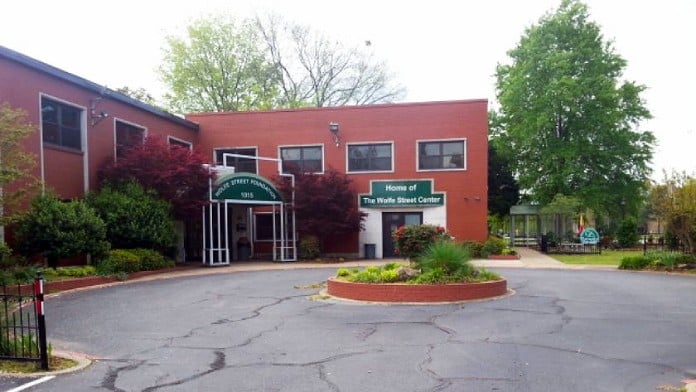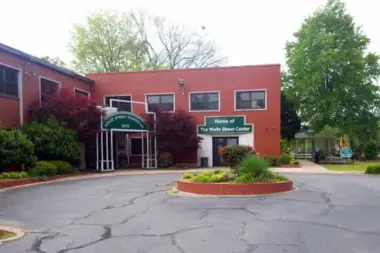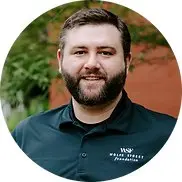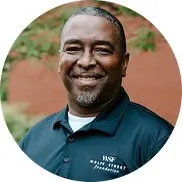About Wolfe Street Center
Wolfe Street Center is an addiction recovery center in Central Arkansas that seeks to help adults survive and break free from addictions. The facility offers support meetings, individual support, housing support, and educational services.
Serving Pulaski County and the Surrounding Areas Since 1982
Back in 1982, the Wolfe Street Foundation was created as a safe haven for adults seeking a comfortable place to find sobriety. Over the years. it became a headquarters for adults seeking long term freedom from alcohol, drugs, and other addictions. Today, it hosts a number of group meetings like Narcotics Anonymous, Alcoholics Anonymous, Co-Dependents Anonymous, and MAT anonymous. The facility also hosts meetings that focus on faith and community based solutions.
On top of these meetings, Wolfe Street Foundation also offers individualized peer recovery support services. Clients will meet with Peer Recovery Support Specialists and Advanced Peer Recovery Specialists to discuss treatment and support needs. These services are most beneficial for adults who’ve recently been discharged from more intensive recovery programs.
The facility also offers recovery residences for men and women. Depending on the clients needs, they can opt to stay for 9, 12, or 18 months.
One notable feature is the multiple, overwhelmingly positive reviews from former clients and family members of clients. Reviewers most commonly mentioned the caring staff, safe environment, and success rate of the program.
Wolfe Street Center’s Youth Empowerment Project in Little Rock
Another interesting feature of Wolfe Street Center is their Youth Empowerment Project. This service helps provide professional support to youth between 12 and 18 years old. By providing access to mental health support, the program helps empower youth to become confident adults less likely to struggle with addictions.
Facility Overview
Latest Reviews
We did not delete your post yesterday. As is well understood, only the reviewer can remove the post.
You are correct about not renewing AA Archives lease on storage space within the building. After two years of looking for alternate office space for our growing Peer Support and Administrative staff, we found it to be cost prohibitive to expand Wolfe Streets Mission without using all the space available to us within the building. We must take care of ourselves if we are to be here to serve others.
Our Director, who relies on those of us with lived experience, instituted the 1st ALCOHOL FREE Red Carpet Recovery Gala in Wolfe Street's history. Joe M. was around for many of the Red Carpet Recovery Gala’s where alcohol was served.
If you wish to discover facts on how and why decisions are made, please participate this month in our open Board meeting. Time and Date will be announced on our Facebook page. We also have quarterly meetings for all meeting holders and their participants where plans are shared and information and feedback is gathered.
We are also holding the first ever Joe M. Day to celebrate Joe’s contributions to recovery. If you wish to be on the planning committee and participate, we would love to have you there!
Please contact Paulo or Robin.
“It is a spiritual axiom that every time we are disturbed, no matter what the cause, there is something wrong with us.”
– Chapter: *Into Action* – Page: 90
Rehab Score
Gallery


Accepted Insurance
Other Forms of Payment
Self-pay involves paying for treatment out of your own pocket. You can use savings or credit, get a personal loan, or receive help from family and friends to fund your treatment. If you don't have insurance or your insurance plan doesn't cover a specific program, self-pay can help ensure you still get the care you need.
Military members, veterans, and eligible dependents have access to specific insurance programs that help them get the care they need. TRICARE and VA insurance can help you access low cost or no cost addiction and mental health treatment. Programs that accept military insurance often have targeted treatment focused on the unique challenges military members, veterans, and their families face.
Addiction Treatments
Levels of Care
Outpatient rehabs ensure that clients continue to receive robust and consistent therapeutic care without requiring them to reside at the treatment center. The frequency and intensity of treatment depend on clients' evolving needs, ranging from daily to weekly addiction counseling and recovery education. Outpatient programs often include peer coaching, life skills training, and individual, group, and family counseling. Outpatient levels of care include partial hospitalization (PHP), intensive outpatient (IOP), sober living/halfway housing, and standard outpatient care.
Treatments
The goal of treatment for alcoholism is abstinence. Those with poor social support, poor motivation, or psychiatric disorders tend to relapse within a few years of treatment. For these people, success is measured by longer periods of abstinence, reduced use of alcohol, better health, and improved social functioning. Recovery and Maintenance are usually based on 12 step programs and AA meetings.
The goal of drug rehab in Arkansas is to help individuals stop using addictive substances and learn healthy ways to remain clean long-term. Participants learn vital skills to cope with cravings and manage stress, to prevent relapse.
A combined mental health and substance abuse rehab has the staff and resources available to handle individuals with both mental health and substance abuse issues. It can be challenging to determine where a specific symptom stems from (a mental health issue or an issue related to substance abuse), so mental health and substance abuse professionals are helpful in detangling symptoms and keeping treatment on track.
Opioid rehabs specialize in supporting those recovering from opioid addiction. They treat those suffering from addiction to illegal opioids like heroin, as well as prescription drugs like oxycodone. These centers typically combine both physical as well as mental and emotional support to help stop addiction. Physical support often includes medical detox and subsequent medical support (including medication), and mental support includes in-depth therapy to address the underlying causes of addiction.
Programs
Adult rehab programs include therapies tailored to each client's specific needs, goals, and recovery progress. They are tailored to the specific challenges adult clients may face, including family and work pressures and commitments. From inpatient and residential treatment to various levels of outpatient services, there are many options available. Some facilities also help adults work through co-occurring conditions, like anxiety, that can accompany addiction.
Young adulthood can be an exciting, yet difficult, time of transition. Individuals in their late teens to mid-20s face unique stressors related to school, jobs, families, and social circles, which can lead to a rise in substance use. Rehab centers with dedicated young adult programs will include activities and amenities that cater to this age group, with an emphasis on specialized counseling, peer socialization, and ongoing aftercare.
Teen programs are designed to address the unique pressures teens face, pressures that can drive them to experiment with dangerous, addictive substances. They need programs that meet them exactly where they are and give them tools for long-term recovery. Therapy can help teenagers understand and work through underlying issues so they can reclaim the life ahead of them.
Clinical Services
In individual therapy, a patient meets one-on-one with a trained psychologist or counselor. Therapy is a pivotal part of effective substance abuse treatment, as it often covers root causes of addiction, including challenges faced by the patient in their social, family, and work/school life.
Group therapy offers men and women the opportunity to learn essential coping skills from their peers who have practiced these skills in the community. You learn new communication techniques and relapse prevention strategies that promote sobriety and sustainable recovery.
Amenities
-
Residential Setting
Staff

Justin Buck
Executive Director

Monte Payne, PRPS
Programs Manager

Dori Haddock
Board of Director President

Mike Moore
Board of Director Vice President

Allen Engstrom
Board of Director Treasurer

Laura Monteverdi
Board of Director Secretary
Contact Information
1015 Louisiana St
Little Rock, AR 72202





